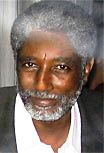Rights activist freed by Sudanese authorities
By Joe Humphreys, The Irish Times
 KHARTOUM, May 17, 2005 — A Sudanese human rights activist who was prevented from travelling to Dublin last week to accept an award from President Mary McAleese has been freed from custody.
KHARTOUM, May 17, 2005 — A Sudanese human rights activist who was prevented from travelling to Dublin last week to accept an award from President Mary McAleese has been freed from custody.
Mudawi Ibrahim Adam, who was arrested in Khartoum nine days ago, told The Irish Times last night he had been released unhurt. “They gave me my passport and camera and I just walked out. I do thank all of those people who supported me. The pressure is part of the reason for my release.”
Dr Mudawi was arrested for taking camera footage of street scenes in the Sudanese capital and that he had planned to show at the Dublin prize-giving ceremony. He was charged with “espionage”, an offence that can carry the death penalty.
In the absence of the 49-year-old engineer and university professor, Mrs McAleese presented the inaugural Front Line Award for human rights defenders to Dr Mudawi’s wife and daughter in Dublin on Friday.
The President joined politicians and other public figures in calling for the release of the activist, who was involved in brokering peace deals and providing emergency assistance in war-torn Darfur.
Motions of support for Dr Mudawi were moved in both the Seanad and the European Parliament. Front Line, the Dublin-based human rights group which spearheaded the campaign for his release, said it would be seeking to ensure all charges against Dr Mudawi were dropped, including a charge of “attempting to commit suicide”, which was levelled against him when he went on hunger strike during a prior detention. If found guilty of the offence, he could have faced a one-year prison sentence.
Dr Mudawi, who is chairman of the Sudan Social Development Organisation, said last night he had already resumed his work for the victims of the conflict in Darfur. “These people need us,” he said.
Dr Mudawi was previously detained for over a month this year in a “ghost house”, part of the notorious network of private residences used by Sudanese military for secret detentions and torture.
